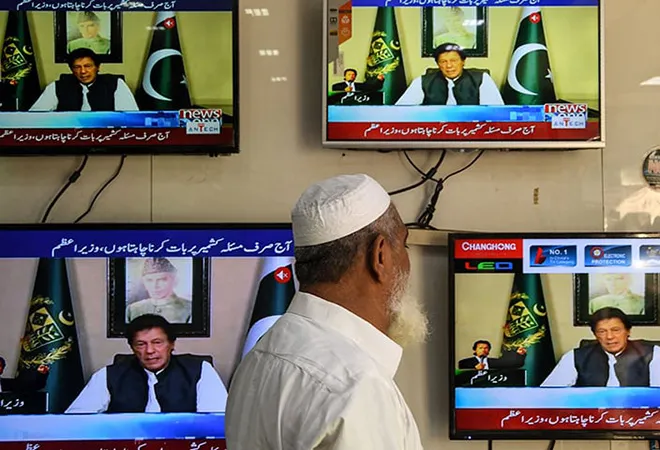-
CENTRES
Progammes & Centres
Location
Reveals continuing limitation of politics and Imran Khan’s failure to change it

Despite all the pressures, the no-confidence motion got through by a relatively narrow margin. As of now, Imran’s PTI seems to be standing by him.The election stage was set by the army in disqualifying and imprisoning Sharif, leaving his party struggling, while attacks were launched on media groups like Jang and Dawn and collecting characters to help create a majority in the elections. Imran must ask himself why the army, the real power in the country, stopped supporting him and how two warring dynasties — Shehbaz Sharif’s Pakistan Muslim League (Nawaz) and Bilawal Bhutto’s Pakistan People’s Party — buried their feud and agreed to get together to oust him. As for smaller players like Maulana Diesel (Pakistan Democratic Movement chief Maulana Fazlur Rehman), they have usually gone whichever way the wind blows. He has also made egregious enemy of the United States who he has accused of wanting to topple him. The ‘evidence’ he provided is rather thin —the record of a conversation between the Pakistan ambassador in Washington and the senior-most State Department official dealing with South Asia, Donald Lu, is hardly credible. Lu’s reported comment that there could be ‘implications’ if Khan survived the vote of confidence hardly constitutes a smoking gun. At worst, it is an indiscretion. Though it is true that he queered the pitch with Washington by his ill-timed visit to Moscow, on the very day Putin decided to invade Ukraine. Regime change is not usually done that way. Washington could well have had a hand in the army decision to take a neutral stance, but given the well known tensions between Imran and the army, the US really did not need to do much. Actually, the writing on the wall had been there for a while now. For the past two years, Imran’s PTI has been coping with dissension, both internal as well as from the MQM. A major problem here has been the poor performance of the government which has persuaded its allies to distance itself from the PTI, but no doubt the key role was played by the army that had helped create the PTI-MQM coalition in the first place in 2018, and now adopted a ‘hands-off’ policy with regard to the government. There were reasons for that. In 2019, just before Bajwa’s term was to expire on November 28, there was a tussle between the executive and the Supreme Court over his extension. The PTI government had granted him a three-year extension in August but this was challenged and the SC questioned the procedural issues relating to it. An earlier challenge to an extension, that to Gen Ashfaq Parvez Kayani in 2010, had been struck down by the Islamabad High Court. Eventually, the court allowed six-month extension which enabled the Pakistan senate to pass a bill that enabled his extension till November 2022. Later, Shehbaz Sharif alleged that Imran had deliberately delayed the process or was, at least, less enthusiastic about the extension than the other opposition parties.
The PTI government had granted him a three-year extension in August but this was challenged and the SC questioned the procedural issues relating to it.In October 2021, a month after the ISI chief, Lt Gen Faiz Hameed, had preened himself in Kabul following its capture by the Taliban, he was shunted out as the Peshawar corps commander, and replaced by Lt Gen Nadeem Anjum. Technically, the ISI chief is appointed by the Prime Minister in consultation with the army chief. According to reports, the appointment was preceded by a three-week standoff between Imran and the army chief over shifting out Hameed, and the appointment of Anjum. Reportedly, Hameed had become close to Imran and was seen as a useful ally in his position as the ISI chief. An inevitable consequence of the army-led process that had overseen Imran’s appointment was the growing bonhomie between sworn rivals — the Pakistan Muslim League (Nawaz) and the Pakistan People’s Party (PPP). In its own way, this brings out the continuing limitation of Pakistan’s politics and Imran’s failure to change it. The army had hoped that Imran would provide the good governance needed to stabilise Pakistan and set right its economy, but the PTI government’s inexperience as well as the Covid crisis doomed its efforts. Imran played up his fresh credentials by saying he would create a ‘Naya Pakistan’ where corruption would be rooted out and there would be more jobs for all.
The views expressed above belong to the author(s). ORF research and analyses now available on Telegram! Click here to access our curated content — blogs, longforms and interviews.

Manoj Joshi is a Distinguished Fellow at the ORF. He has been a journalist specialising on national and international politics and is a commentator and ...
Read More +